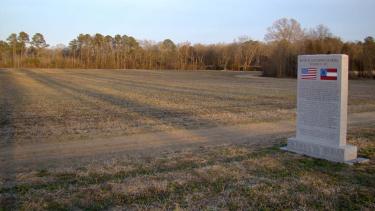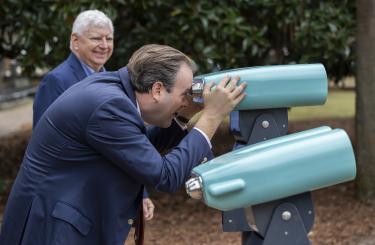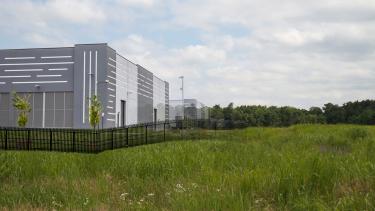For 24th Straight Year, American Battlefield Trust Protects More Than 1,000 Acres Of Hallowed Ground
Jared Herr, jherr@battlefields.org
(Washington, D.C.) — From preservation efforts at irreplaceable historic sites, to reaching its milestone 160th battlefield preserved, 2024 represented a landmark year for the American Battlefield Trust. The nonprofit organization engaged in legal battles to halt development on hallowed ground, reached millions of students with its education resources and utilized innovative technology to bring historic sites to life, all while saving land in nine states — during its 24th consecutive year protecting more than 1,060 acres.
“The success of our organization is a victory for our membership, donors and our great nation, whose history we fight every day to preserve,” said Trust President David Duncan. “For us, 2024 was a year full of landmark achievements, and I look forward to building on this energy to find even more success in the year to come, as we begin to mark the United States Semiquincentennial — the 250th anniversary of the Revolutionary War.”

Although the acquisition of land at Goldsborough Bridge, N.C., marked the organization’s 160th battlefield saved this autumn, it was one of 26 battlefields where the Trust saved land through 39 individual transactions. Other transactions were completed at important battlefields from the War of 1812 and Civil War: Antietam, Md.; Bentonville, N.C.; Brandy Station, Va.; the Breakthrough at Petersburg, Va.; Champion Hill, Miss.; Chickasaw Bayou, Miss.; Cold Harbor/Gaines’ Mill, Va.; Corinth, Miss.; Franklin, Tenn.; Fredericksburg, Va.; Gettysburg, Pa.; Glendale, Va.; Kernstown, Va.; Manassas, Va.; Munfordville, Ky.; Nashville, Tenn.; New Market, Va.; New Market Heights, Va,; Newtown, N.Y.; Sackets Harbor, N.Y.; Second Deep Bottom, Va.; Shepherdstown, W.V.; Shiloh, Tenn., Stones River, Tenn.; and White Oak Road, Va.
A particular highlight of the year was the dedication of Culpeper Battlefields State Park, which marked the culmination of nearly three decades of preservation work by the Trust. When Governor Glenn Youngkin officially dedicated the 43rd unit in the Virginia State Parks system on June 8, it encompassed 263 acres around the crest of Fleetwood Hill at the Brandy Station Battlefield, the epicenter of the largest cavalry battle ever fought in North America. Further donations of land from the Trust and its partners to the Commonwealth will ultimately exceed 2,000 acres.
The Trust also transferred significant landscapes totaling over 625 acres to the National Park Service in 2024, including properties at Chancellorsville within Fredericksburg & Spotsylvania National Military Park (Va.), Fort Gregg within the Richmond National Battlefields Park (Va.), Hatcher’s Run within Petersburg National Battlefield (Va.), Mill Springs Battlefield National Monument (Ky.), Saratoga National Historical Park (N.Y.), Shiloh National Military Park (Tenn.) and Vicksburg National Military Park (Miss.). These transfers allow this hallowed ground to be in the permanent care and stewardship of the National Park Service, deepening the interpretive offerings and public accessibility at the sites.
The Trust was also active on the interpretive front, particularly in with the expansion and enhancement of the vision behind The Liberty Trail, which began in South Carolina in 2019. The Liberty Trail NJ app, available in the App Store or Google Play store, offers an in-depth tour of Revolutionary War sites related to the Ten Crucial Days campaign, and new modules covering other events will follow. More states will be added to the growing network in 2025 and beyond.

On-site interpretation also saw innovations. In Charleston’s Marion Square, a series of pavers was installed in February to trace the physical outline of the Horn Work that defended the city. The December unveiling of an augmented reality site, including physical “binoculars” allows visitors to see historic features superimposed on the modern landscape. Similar AR experiences also exist for Fort Watson and Fort Fair Lawn. In the Garden State, the Trust’s Reimagining Princeton effort collaborated with New Jersey State Parks, Forests & Historic Sites and the Princeton Battlefield Society to unveil 11 new interpretive signs, plus the nation’s first “battle window” that overlays period artwork with the modern landscape, enabling visitors to better understand a decisive moment in American history.
Trust education efforts continued to expand in reach, as we surpassed 100 million views on YouTube for our video content, launched our Boom Goes the History podcast, and passed the milestone of 50,000 students sent to experience historic sites through our History Field Trip Grand Program. Meanwhile, tens of thousands of visitors across the states enjoyed the American Revolution Experience, a traveling exhibition created in collaboration with the Daughters of the American Revolution that has visited 64 venues and counting. The inaugural American Battlefield Trust Prize for History, an initiative designed to showcase how historic landscapes serve as primary sources indispensable to researchers, went to Dr. Elizabeth Varon for Longstreet: The Confederate General Who Defied the South.
On the legislative front, the Trust celebrated the passage of the American Battlefield Protection Program (ABPP) Enhancement Act, a bipartisan reform bill sponsored by 67 senators and representatives. The legislation, passed as part of the Expanding Public Lands Outdoor Recreation Experiences Act, refines the already successful ABPP, going even further to ensure the preservation, restoration and interpretation of our nation’s most hallowed battlegrounds.

Modern-day threats continued to endanger our nation’s hallowed ground in 2024, but the Trust continued the fight against these forces with fervor. The Trust has been actively engaged in legal battles to block the Prince William Digital Gateway, slated to be the world’s largest data center complex, directly adjacent to Manassas National Battlefield Park and the Wilderness Crossing mega-development in Orange County, just outside Virginia’s Fredericksburg and Spotsylvania National Military Park. The latter situation earned a place on the National Trust for historic Preservation’s 2024 list of “America’s 11 Most Endangered Historic Places,” which also featured the Revolutionary War battlefields at Lexington and Concord, faced with expansion of a neighboring airport.
As the calendar turns to 2025, the organization remains as resolved as ever to the preservation of America’s hallowed ground and educating and inspiring all those who seek to learn the history of our country.
The work of the Trust completed throughout 2024 would not have been possible without the assistance of numerous government and private partners, including: American Battlefield Protection Program; Battle of Franklin Trust; Appomattox-Petersburg Preservation Society; Battle of Nashville Trust; Brandy Station Foundation; Capital Region Land Conservancy; Central Virginia Battlefields Trust; Commonwealth of Kentucky; Commonwealth of Virginia; Franklin’s Charge; Friends of Fort Negley; Friends of Vicksburg National Military Park and Campaign; Goldsborough Bridge Battlefield Association; Hart County Historical Society and Museum; HTR Foundation; Jefferson County Farmland Protection Board; Jefferson County Historical Landmarks Commission; Kernstown Battlefield Association; Land Conservancy of Adams County; Manassas Battlefield Trust; Metro Nashville, Tennessee; Mississippi Department of Archives & History; Mississippi Historic Site Preservation Fund; National Park Service; North Carolina State Capital Infrastructure Fund; Petersburg Battlefields Foundation; Richmond Battlefields Association; Save Historic Antietam Foundation; Shenandoah Valley Battlefields Foundation; State of New York; State of North Carolina; Tennessee Historical Commission; Tennessee Wars Commission Civil War Sites Preservation Fund; Virginia Land Conservation Foundation; and the Virginia Battlefield Preservation Fund; Wayne County, N.C.
From a grassroots organization started by historians 30 years ago, the American Battlefield Trust has grown into one of the most successful private heritage land preservation organizations in the nation. The Trust is dedicated to preserving America’s hallowed battlegrounds and educating the public about what happened there and why it matters today. The nonprofit, nonpartisan organization has protected nearly 60,000 acres associated with the Revolutionary War, War of 1812 and Civil War, representing more than 160 sites in 25 states. Its 350,000 members and supporters believe in the power of place and the continued relevance of history as a means to fully understand our rights and responsibilities as Americans. Learn more at www.battlefields.org.
###